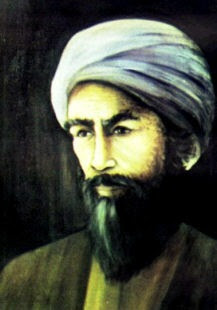Definitely an impressive name.
Niki and I are travelling to Spain next Spring and I'm not sure if we'll be able to make the stop to Malaga. If not, I'm hoping I can find some traces of him in Seville where he studied.
Definitely an impressive name.
Lived from 1197 to 1248. He is considered one of the major scientists of Muslim Spain. Born in Malaga Spain, he studied botany in Seville from Al-Nabati who was an early developer of the scientific method and valued empirical, experimental techniques for assessing medicinal plants and techniques. The practice rubbed off on Ibn al-Baitar. I'll mention that his father was a veterinarian (al-Baitar is Arabic for veterinarian). He himself was a physician and a botanist, which is a HUGE recurring theme among botanists, as many physicians saw the benefits of plants to medicine and dove into a better understanding of the natural world.
In 1219 he left Spain and traveled the northern coast of Africa as far as Anatolia. His journeys took him to Bugia, Constantinople, Tunis, Tripoli, Barqa and Adalia. After 1224 he entered the service of Malik al-Kamil, an Ayyubid Sultan (get ya history on), as chief herbalist. Shortly after, in 1227 al-Kamil extended his territory into Damascus and Ibn al-Baitar accompanied him there where he collected plants from Syria, Palestine, and a good portion of Iraq.
Ibn al-Baitar
All in all he studied medicinal plants and literature from Greece, Spain, North Africa, Turkey, and the aforementioned Syria, Palestine, and Iraq. Very impressive for the time. Bear in mind this was the 13th century. According to Sarton, the author of the Introduction to the History of Science, Ibn al-Baitar was the greatest herbalist of the Middle ages. No one excelled or equaled him til the 17th century. That's just opinion of course, but certainly mighty praise. In his two books, which I'll mention shortly, he gives names in Arabic, Greek, Latin, and Spanish, helping facilitate the spread of knowledge to Europeans and other readers. My kinda guy. It's not what you know, it's what you share.
Fleur de chicorée (Cichorium intybus) Photo Credit: Père Igor
Why highlight the introduced and naturalized common chicory? Because, although it was widely known, Ibn al-Baitar was the first physician to compound it and use for the treatment of cancer and tumors. Fun fact.
So his two works, which became standard materia medica for centuries in Europe, are Kitab al-Jami fi al-Adwiya al- Mufrada or The Book of Medicinal and Nutritional Terms and Kitab al-Mlughni fi al-Adwiya al-Mufrada or Comprehensive Book of Drug and Nutrition. In these books he describes over 1,400 plants (200 to 300 of which were new to medicine). He is noted for careful observation, detailed note taking, and even a bit of ethnobotany to explore the uses of plants by locals in the areas he visited.
Truly he was a light of science and reason in an age when darkness was soon to spread throughout Europe. He served out the last of his life in Damascus amidst an atmosphere of peace and learning and died in 1248.
I give you a man who came from Spain and lived and died in Syria amidst a time in which the opposite is extremely difficult.
Enjoy.



:)
ReplyDelete